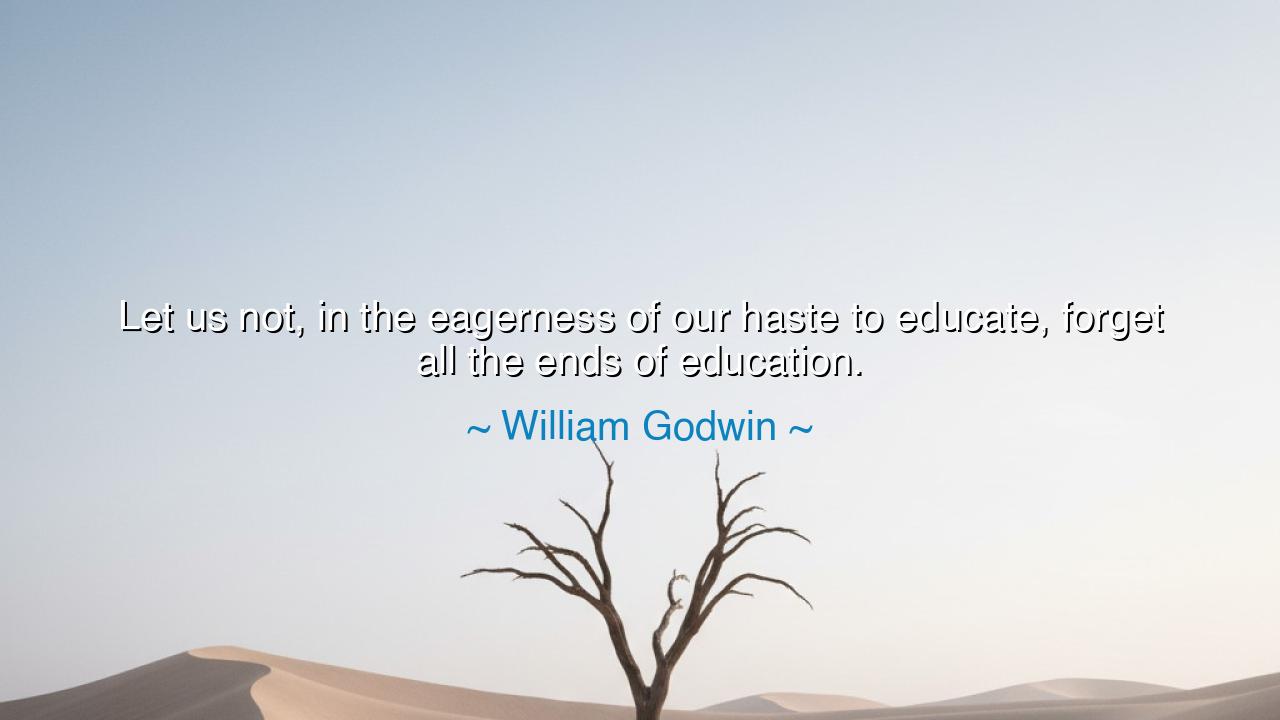
Let us not, in the eagerness of our haste to educate, forget all
Let us not, in the eagerness of our haste to educate, forget all the ends of education.






William Godwin, the radical thinker of the Enlightenment, once spoke with caution and vision: “Let us not, in the eagerness of our haste to educate, forget all the ends of education.” In these words, he offers not a rejection of learning, but a warning: that in our zeal to instruct, we must not narrow the path of education to mere speed or efficiency. True education is not only the filling of the mind with facts, but the shaping of the soul, the cultivation of virtue, and the awakening of the whole human being.
The meaning of this wisdom is as clear as it is profound. Godwin saw that societies often rush to expand schools, to multiply lessons, to raise standards quickly—yet in their haste, they risk forgetting the true ends of education: wisdom, integrity, compassion, and freedom of thought. To train a child in numbers and letters is useful, but if that child emerges greedy, cruel, or narrow in spirit, then the goal of education has been betrayed. For education is not only about producing workers or scholars—it is about producing human beings worthy of the name.
The origin of Godwin’s thought lies in his revolutionary age. He lived in the late 18th and early 19th centuries, when Europe was aflame with political upheaval and new ideas. As a philosopher, novelist, and father, he wrestled with how societies might build free and just citizens. He believed fervently in the power of education, but he feared that governments and institutions might seize it for their own ends—training children to obey, to conform, to serve the state, while neglecting the higher purpose of nurturing independent and virtuous souls. His warning is timeless: do not let education be reduced to a tool of haste or utility.
History gives us stark examples. Consider the Prussian model of schooling in the 19th century, admired and copied across the world. It produced disciplined, literate citizens, but often at the cost of free thought, for its true aim was to create soldiers and obedient workers. In the haste to educate, nations forgot the broader ends—to produce minds that question, hearts that love justice, and spirits that seek truth. The consequence was generations of people trained to serve, but not always to think freely or act morally.
Yet there are also brighter examples. In India, Mahatma Gandhi resisted colonial models of education that prized rote memorization and mechanical learning. He urged instead for an education rooted in truth, service, and self-reliance. His vision was not hurried, nor was it obsessed with narrow utility. It sought to form whole human beings who could rebuild their nation with wisdom and moral strength. Gandhi’s schools taught weaving, farming, and philosophy side by side, reminding us that the ends of education are not speed or prestige, but the flowering of human character.
The lesson for us is urgent. In our own age, we too rush—rushing to teach coding, rushing to train for jobs, rushing to measure children by numbers and tests. But let us not, in this haste, forget that education must also teach kindness, courage, patience, humility, and the pursuit of truth. A society filled with clever minds but empty hearts will not endure. A nation that produces skill without virtue produces brilliance without wisdom, and power without conscience.
So what must you do? If you are a parent, remember that your child’s heart is as sacred as their mind. If you are a teacher, do not only rush through lessons, but pause to nurture curiosity and character. If you are a citizen, demand schools that teach more than exams—that cultivate citizens who will act with justice and compassion. And if you are a student, remember that the goal is not only to know, but to live wisely.
Thus, remember Godwin’s words: “Let us not, in the eagerness of our haste to educate, forget all the ends of education.” Carry them like a shield against the pressures of haste. For true education is not a race, but a lifelong pilgrimage, leading not merely to knowledge, but to the elevation of the human spirit.






AAdministratorAdministrator
Welcome, honored guests. Please leave a comment, we will respond soon